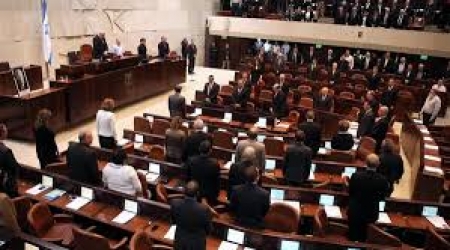The Israeli parliament of the Knesset passed a controversial counterterrorism bill in its first reading, on Thursday, when 45 members voted in favor of the bill, while 14 voted against.According to Al Ray, the bill, which consists of 104 pages, will be introduced to the committees of Constitution, law and justice to be prepared for the second and third reading. It increases the Israeli occupational government’s authority and expands the definition of what constitutes a ‘terrorist organization’.
The bill stated that the punishment of those who help the ‘terrorist’ is the same as the terrorist himself. It also raises the maximum penalty for many offenses linked to ‘terrorism’ to 30 years of actual imprisonment, and three years of actual imprisonment punishment for those who support a ‘terrorist organization’.
The bill gave the Israeli Minister of Security the authority to announce any group which supports a ‘terrorist organization’, even if it does not conduct any terrorist actions.
It also deals with any charity association that has relation with the Hamas movement as a terrorist organization. (Hamas was democratically elected in 2006, with the nomination of Ismail Haniyeh as Prime Minister over the Gaza Strip.)
It also provides two years imprisonment for anyone over 12 years who has activity in charity organization or simply wears a shirt with expressions of solidarity with the organization. It also allows the submission of written testimony to the court without bringing in witnesses.
It also allows the arrest of people for 48 hours, and without access to legal counsel or appearing before a court to extend the arrest. It gives the general security service (Shin Bet) the authority to use computerized monitoring to follow the suspected people via Israeli Prime Minister authentication only.
Adalah center considered the passing of the bill to be a dangerous escalation of repression in Israel. It added that, ‘The law substantially strengthens and widens the powers of the police and the General Security Services (‘Shabak’ or Shin Bet) to suppress any legitimate protest activities against Israeli policies. It also enables the use of ‘secret evidence’ in order to take preventative measures against these activities, which impedes the possibility of objecting to these repressive decisions based on their merits before the judiciary.’
Adalah emphasized that if the new ‘Anti-Terrorism Law’ passes, it would ‘seriously escalate the level of repression and intimidation targeted against the political activity of Palestinians in Israel, through the criminalization of political, cultural and social relationships between them and the rest of the Palestinian people.’
IMEMC archive story: 05/29/15 Israel 2015: A Government of Extremists in Charge of An Out-of-Control Military

